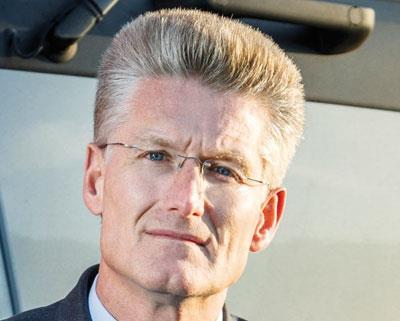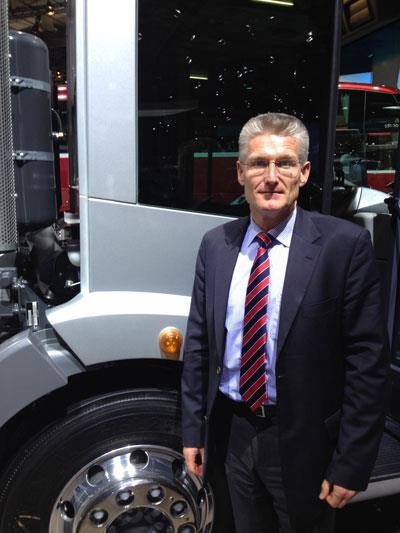
Michael Kamper took on the new role of UK MD of Mercedes-Benz Trucks when the truck importer restructured its commercial vehicle operation in January 2014. He describes his business as a “microcosm” of the factory in Stuttgart.
“I have to raise the funds for the testing, purchasing, the route to market, sales force, in-service support and the remarketing of used vehicles,” Kamper says. “So it is a mirror image effectively, with one big difference - I don't produce vehicles. But then again, I actually have a small factory at Wentworth Park, where we do modifications, bodybuilding and refurbishment of used vehicles. Obviously stock turn and managing risk effectively are absolutely key.”
The historically low levels of truck sales in the last recession has meant a shortage of good quality late model used Euro-5 trucks.
“We're all suffering from years of low volume supply,” says Kamper. “Between 2009 and 2011, the market was significantly lower than normal. The amount of vehicles replaced by the larger fleets was significantly down. If you look at the planned returns coming back on my books, this only covers about 50% to 60% of the volume I need. But the scarcity of product makes for good reselling prices. That holds true for Euro-5 and Euro-6, and they are attracting outrageous amounts of money, which is not representative of what the vehicles will be worth in three years time.”
Last year Mercedes-Benz sold 1,159 used vehicles, only two-thirds of which were taken in part-ex for a new truck. “The balance we actually repurchased, by going to operators and asking if they would sell us particular vehicles,” says Kamper. “That's worked quite well but I understand this is a phase that is not going to continue forever.”
Market recovery
One big unknown factor with Euro-6 is how well they will sell overseas when they reach the end of their life in the UK. “Euro-6 vehicles require low-sulphur diesel and do not lend themselves to be exported to our traditional markets,” says Kamper. “I see a constraint on the countries we can export to either because of age restrictions or lack of supply of clean diesel.”
Following the pull forward in Euro-5 sales in December last year, Kamper does not expect the truck market to recover until 2015.
“The market is recovering to pre-crisis levels, not in 2014 but in 2015,” he says. “At that point, the pull forward will have washed completely through the system. I am in the fortunate position that our Euro-6 model line up has been tried and tested since July 2011 so I can confidently state it actually works. Fuel efficiency has been proved and our service network has become more than just acquainted with these vehicles and can guarantee the best possible up-time.”
The added complexity of Euro-6 has given another uplift in the percentage of trucks sold with a manufacturer repair and maintenance package. All Mercedes-Benz tractor units come with a two-year integrated service package, and 20% of heavy trucks are having that extended to a third year. “So every other Mercedes-Benz truck is sold with an OEM branded R&M package on it, which is quite a strong position to be in. I believe that increasing our penetration to 66% in the next four to five years is doable,” says Kamper. “Many family-owned businesses, for reasons we fail to comprehend, still operate their own workshops. If you're in the food distribution business, say, why on earth bother with servicing vehicles? Vehicles with a well-documented service history attract a premium in their second life.”
Buy cheap
Despite Mercedes-Benz calculating that the purchase price of a truck only makes up 10% of the total cost of ownership, many operators still buy the cheapest vehicle they can.
“I think there are two perspectives here, which I sometimes struggle to understand,” says Kamper. “The first is that we have had four consecutive years of post-crisis recovery, and I believe there are still cash flow related issues. So an operator will say ‘I'm only awarded contracts in some cases with a duration of one or two years and if I buy a vehicle outright, I'm stuck with it for at least four or five years, and I have to sort the payments myself. If I take out an operating lease, I still have to take a leap of faith by committing to continuous payments over a three year period, which I don't know I have to work for’. So that leads to a focus on the capital cost, which is a fact of life, even though it's beside the point.
“The second is, from a purely rational point of view, whether it's £5,000 or £8,000 difference in capital cost, you can make an argument based on proven fuel saving with Euro-6. We are beating any competitor by a minimum of 3%. If you equate that across three, four or five years, and if you take 9.4mpg as the base fuel consumption, even if you take the tax off the price of diesel, you're easily looking at saving £2,000 or more a year.”
Operators have reported that there have been some good deals available on Euro-6 Mercedes-Benz Actros tractors, a fact that Kamper accepts: “The price differential [on Euro-5] isn't as great as it used to be and I have heard of some very good deals being done. We are becoming increasingly more competitive, because the current reselling values for used product allows us to be confident in underwriting new product.”
But he says the sharp pricing on the Actros is not being driven by the OEM imposing tough sales targets on dealers.
“What we are not doing is shoehorning our dealers into monthly targets by saying ‘you need to hit that volume otherwise you won't qualify for a certain element of bonus’. This is a push technique you will find in the passenger car and van arena, which obviously is a different operating model. Truck dealers get paid as they earn. So if they don't sell in the first and second quarters, they don't generate any income off the back of the metal. But most importantly they don’t generate income from the R&M and over-the-counter parts sales.”
Pull model
Despite the expected increase in European truck sales in 2015, there is plenty of capacity among the OEMs to increase production, and no one is predicting a shortages of vehicles.
“We're operating a pull model, and that is the way I manage my production allocation, which is my mini factory,” says Kamper. “Effectively we build to order, and in the monthly production meetings we will take a view, with roughly a three-month lead time, of what we forward order to make sure we've got the right model mix.”
OEM finance is also of growing importance in funding the acquisition of Euro-6 vehicles. “My finance penetration rate is 47% right now, and it'll be north of 50% this year,” says Kamper. “I'm very keen to get closed buy-backs because I want to control the asset when it comes back. And it's very much about ensuring that we have consistency of delivery of vehicles and services across the network.”
The recent recession saw the UK truck parc shrink as fewer new vehicles were bought than were scrapped or exported, but Kamper expects this trend to be reversed in 2015.
“In 2014 we are going to stop the decline in the vehicle parc, because the pull forward last year was significant. And 2012 was an OK year, not brilliant, but at least the parc isn't shrinking anymore, which is quite key,” he says. “A lot of capacity was decommissioned in 2009 and lots went for export. Export of vehicles under seven years old is actually the enemy of a franchise-owned dealer network.
“If you export three and four year old vehicles, that's insane, because you are basically missing the opportunity of locking people into the second-life R&M. Unfortunately, some dealers have exported Mercedes Benz trucks. What I'm saying is, ‘gentlemen, think twice’. Buy the vehicle used, package it again, and resell it. When it gets towards the end of the life cycle, it doesn’t matter if it gets stripped for parts or exported. But if you export vehicles younger than seven years, you are shooting yourself in the foot. Keep it in the country, and keep it running.”
Econic eight-legger will find favour with UK operators
Mercedes-Benz’s Econic low height cab is a common sight on refuse collection and other specialist vehicles in UK town centres. It has recently also found favour with construction hauliers including Laing O’Rourke running into London because it gives drivers a greatly improved view of vulnerable road users such as cyclists. But at present Econic is only available on 4x2, 6x2 and 6x4 trucks at Euro-6.

“When we launched Euro-6, not all key models were available from day one. On Actros it's easier because you know the volume sellers,” says Kamper (pictured with an Econic cab at the IAA Show in Hannover), who has championed the Econic range within Mercedes-Benz. “On Econic, it's so much harder. Econic is only an annual production of 1,200 units, and the model mix is quite diverse, from refuse collection to fire trucks, you name it.
“So the decision was taken to go into Euro-6 at the earliest possible point in time, but with a limited number of vehicles. So what we didn't have in the UK for most of 2014 was a cab for the domestic waste side loader application. That was released in September, so we effectively missed out on three quarters of the year with side loaders.
“We typically sell between 450 and 500 Econics in the UK, which is a big volume. This year we are likely to sell more like 250 due to lack of availability of all variants. By 2015, we'll have the full model range at our disposal.”
This will include a brand new Euro-6 Econic 8x4 chassis cab. “We've bounced the idea off the big players,” says Kamper. “The only limiting factor is the driveline. The Econic has the same frame rail components as its siblings Actros and Antos, which by the way wasn't the same with its Euro-5 predecessor. That was still based on the old Axor frame, and obviously had not been updated. So it's not just a face lift, it's a completely new vehicle. The downside is that driveline will use the medium duty engine and the highest output you can get is just slightly north of 300hp.”
That means operators wanting to run at the maximum 32t GVW will be limited on the gradients the vehicle will be able to tackle – not a problem if all it is doing is delivering to construction sites in London however.
The extra cooling required for Euro-6 engines also means the cab floor has had to be raised, restricting cross cab access slightly. This too is not a problem for most construction hauliers as cross cab access is not a high priority. Fitting a bigger, more powerful engine would however mean moving the driveline back, cutting the length of body that could be fitted, and raising the whole cab, defeating the purpose of the Econic concept.














